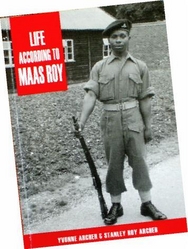Maas Roy and the dead colonel
Published: Monday | December 21, 2009


In Life According Maas Roy, Yvonne Archer documents the life stories of Stanley Roy Archer, her father. With Yvonne as narrator and Stanley Roy the direct voice, together they have written a memoir that is not only funny, dramatic and nostalgic, but is of substantial historical value to people in the black diaspora. Today, His Story gives you a slice of an enthralling story of a man who is short in physical stature, but larger than life in his daughter's eyes.
When Stanley Roy Archer, who was born in Jeffrey Town, St Mary, left Jamaica on October 13, 1954, with a one-way ticket to England, partly funded by a loan from his brother, Desmond, he had big dreams of getting rich. Moving on to Canada was also a part of his master plan.
At age 22, with his small, brown leather suitcase of floral shirts, he boarded the Italian vessel, MV Napoli, a refurbished warship. Unbeknownst to Stanley Roy, the ship wasn't going straight to England. There were stops at many other ports before the ship finally reached Genoa, Italy, six weeks after his departure. From Genoa, he travelled by train to Paris and then Calais, France. It was by ferry that he journeyed to Dover, England. Another train ride took him to London.
By taxi he found his friend Roy Hughes, with whom he would stay at Nelson Road, in the north London district of Hornsey. Culture shock set in; white people sweeping the streets, strange-looking houses with chimney pots from which black smoke filled the air, the use of hot-water bottles for warmth, the serving of fish and chips in newspaper, unwrapped bread, and bombed-out houses were some of the things that stood out. "So I said, 'What a lot of kitchen they have here man!' And he said, 'Man, a nuh kitchen - ah fire they have to warm up the place!' And he showed me the fire and how it worked," he said.
The day after his arrival, he was brought to the Labour Exchange to find work. His first job was at British Paints at Barkingside. That didn't last long, likewise a few other low-paying jobs. London Transport Underground employed him as a 'station man', but the multi-skilled Stanley Roy wasn't going to settle for just one job, especially when there were so many available. Remember, England was rebuilding and Stanley Roy "went to England to work, get rich quick". And work he did.
The good life
After two years, he was living the good life, despite blatant instances of racism.
"Never out of work, Stanley Roy had enough money to spend his Saturday nights in the West End, dancing to ballroom and jazz music with stunning women until the wee hours of a Sunday morning," Yvonne writes. And Stanley Roy Archer worked and danced, and he was to dance some more, but to the beat of a different drum.
Knock! Knock! Knock! came from Stanley Roy's front door at 163 Caledonia Road one fine summer day in 1956. He ran down the stairs and flung the door open. There, in a suit, boots and hat was a white man. He asked Stanley Roy if he was the same. Stanley Roy said yes. Then, it hit him. The white man had caught Stanley Roy off guard, and fate was now twisting his brain for not thinking. It was customary to lie when these officious-looking white men came knocking.
The man was there to inform him he was called up for compulsory National Service. It was the law, every man of working age, except illiterates and invalids, had to serve his country in the army. Migrants from the British colonies weren't exempt.
National service
"These black boys were definitely British for the purposes of national service and neither Queen nor country gave two hoots that they were only in England to make money to send back home to help their families."
Two weeks after the positive identification, his "letter of posting" and a one-way train ticket
were sent to him. He had 14 days to report to camp. "Stanley Roy Archer became one of the intakes of late summer 1956 to 1957 and off he went to endure 12 weeks of square bashing (training)" at "swestry, Shropshire in the British Midlands ... It meant cracks-of-dawn mornings, polishing of boots, making of bunks and ruddy-looking white men shouting at him all the time ... ."
At age 24, Gunner Stanley Roy Archer was the oldest recruit in the 25th Field Regiment Royal Artillery. At the end of the training, he was sent on active duty to Cyprus, where a civil war was raging between Greek and Turkish Cypriots. Being a colony of Britain, British peace-keeping troops were deployed. That was 1957, and he was one of two black men in his battalion, and the only one in his group.
"The boys were scared of going on active duty because an advanced party had gone out to set up camp before we left England, but they were blown up. But I just told them: 'Look, if there's one man coming back to Blighty alive, it's me!'," he told Yvonne.
Collecting dead bodies
In Cyprus, Gunner Archer was assigned to drive the doctor to battery units to give medical attention to those who needed it. A part of their job was to go around collecting dead bodies and body parts. He developed a camaraderie with the doctors to whom he was assigned, especially a young Welshman named Brian, whom Stanley Roy had to take care of when he developed a bad cold.
Because of the nature of his job, Stanley Roy got to wine and dine in the officers dining hall, "the only lowly soldier allowed to do so". That was where he developed a love for pink champagne, which was available in abundance.
Stanley Roy and the medical officer were on the verge of devouring a three-course meal one evening when they were ordered to go give assistance to a colonel and his driver who were fired upon on 'Murder Mile', a dangerous three-mile stretch of road. When they arrived at full speed, the driver was badly wounded. A helicopter tried to take him to hospital, but he died en route. The colonel, with a foot blown off, was dead by the time they arrived.
With bullets flying all around them, the colonel was put on a stretcher which Stanley Roy secured to the back of their lorry with four gun slings. As they were about to speed away, a high-ranking officer turned up with the colonel's foot, wrapped in a blanket. It was given to Stanley Roy, who "unceremoniously threw it into the back of his Army Champ and kissing his teeth and uttering more than a few Jamaican expletives across the gunfire, he jumped in behind the wheel".
Yet, the colonel would not stay still; the hefty corpse kept rolling off the stretcher, and when Gunner Archer had had enough, he decided, yes, enough was indeed enough. He borrowed two gun slings in addition to his two and tied the dead colonel to the stretcher. Stanley Roy says, "I girth the colonel like donkey, and tell him, "Move now if you tink you [bleep, bleep] bad!'"
But the colonel may have had the last laugh. Gunner Archer was given the task of guarding the colonel for the night. In retrospect, Yvonne writes, "Yes, the colonel was definitely deceased, but one side-effect of that infamous night was that unfortunately, for once, poor Gunner Archer was off his food for a few days. And he couldn't even enjoy a decent glass of champagne. Perhaps that was payback for girthing the colonel like a donkey!"
paul.williams@gleanerjm.com
"I girth the colonel like donkey, and tell him, "Move now if you tink you [bleep, bleep] bad!'"
'The boys were scared of going on active duty because an advanced party had gone out to set up camp before we left England, but they were blown up. But I just told them: 'Look, if there's one man coming back to Blighty alive, it's me!'.'







